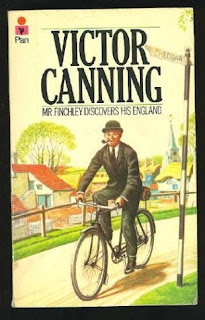Mr. Finchley Discovers His England
(1936/1972/2013/2018)
By Victor Canning
Macmillan, 260 pages.
★★★
First things first: You will
notice numerous publication dates for a work I read this spring as a “new”
e-book. This makes more sense if you’re British. Mr. Finchley Discovers His England (1936) was the first of three
comedic novels penned by Victor Canning (1911-86). It’s a whimsical tale of a
bachelor clerk in a London solicitor’s office forced by a new boss to take his
first holiday. It became an overnight sensation that allowed Canning to quit
his own clerkship and become a fulltime writer*.
The second thing that will
help you appreciate Canning’s novel is to locate it in its own time period and
circumstances. Holidays were not a given in the early 1930s, and 45-year-old
Edgar Finchley had never taken one under his old boss. Finchley knew little of
England beyond London’s metropolitan limits. As Brits had been doing for
several hundred years, Finchley’s abstract idea of a vacation was to book a
hotel in the faded Kent seaside resort of Margate in Kent–some 80 miles
distant. To put it in contemporary terms, it’s the equivalent of a middle-aged
man from Trenton taking his first vacation in Atlantic City.
Finchley never made it to
Margate. At the rail station he is asked to watch someone’s fancy “motor,” as
automobiles were often called in the days in which they were still relatively
new. Finchley crawls into the backseat, falls asleep, and awakes to find that
he has been spirited away by a thief. It would be the first of several zany
mishaps to befall Finchley, many of which involved the fact that a
tweed-covered bald man carrying a rucksack and wearing city shoes is not
exactly prepared to trudge across moors, fall into ditches, sleep in haystacks,
scramble over stone walls, or plunge through nettles. Along a zigzag journey
that will eventually take him across Devonshire, Finchley befriends or battles
with farmers, gypsies, con men, an itinerant artist, orphans, a street band, a
self-proclaimed philosopher, a lunatic, snooty elites, and a smuggler.
You also need to know that
the times were somewhat gentler, the recent war (World War I) notwithstanding.
Even gun-toting thieves were polite, police were respected, gender roles were
prescribed, much of the population was peripatetic, and residents in the
countryside routinely took in scruffy strangers in need of a meal and/or bed.
It was also a time in which rural roads were such that if cyclists wanted to
get away from someone chasing them in van, they could reverse direction and get
a half mile lead before the van could turn around and gain on them.
All of this is to say that
Canning’s breakthrough novel has a quaint throwback charm for modern readers.
To experience that charm one must surrender to it rather than filtering it
through today’s realities. It’s almost enough to make one lapse into romantic
dreams of “simpler” times. Key word: almost. It’s doubtful that today’s readers
will admire Canning’s (non) structure. What we read is a series of vignettes
disguised as a novel. Some have compared the Mr. Finchley books to comedian
Rowan Atkinson’s Mr. Bean series. It’s a decent comparison, as both characters
are basically nebbish innocents overcome by events. To this I would add that
Michael Palin’s “Cycling Tour of Cornwall” sketch for Monty Python owes a debt
to Canning. I don’t know this for certain, but Palin’s character name of Mr.
Pither might be a wink to those who know that Canning originally called his
character “Pitchley.” In any event, Pither’s encounter with rural England is
similarly fraught with misfortune.
To move from the speculative
to the literary, the Mr. Bean and Monty Python analogies work as they call
attention to the fact that the Mr. Finchley “novels” are actually disconnected
sketches basted together loosely. Many Brits actually know the Finchley books
as an individual BBC Radio programs that aired in the 1980s and were revived in
2005. As we see, the Finchley novels also enjoy frequent revival. The moral, I
suppose, is that charm, innocence, and frothy frolick transcend time. It would
be too much to rank Mr. Finchley–or Mr. Bean for that matter–among the classic
works of 20th century humor, but it won’t hurt anyone to take an
unexpected detour now and then.
Rob Weir
*In the British legal
system, a solicitor generally handles civil cases, whereas more prestigious
barristers argue cases in court. A “holiday” is what North Americans call a
vacation. Canning spent most of his life in Devonshire near the port city of
Plymouth. He was born to working class parents and, though he qualified for
Oxford University, there was no money for such an extravagance and he became a
clerk at the age of 16. He is perhaps better known in North American for
creating the Rex Carver detective series.




No comments:
Post a Comment